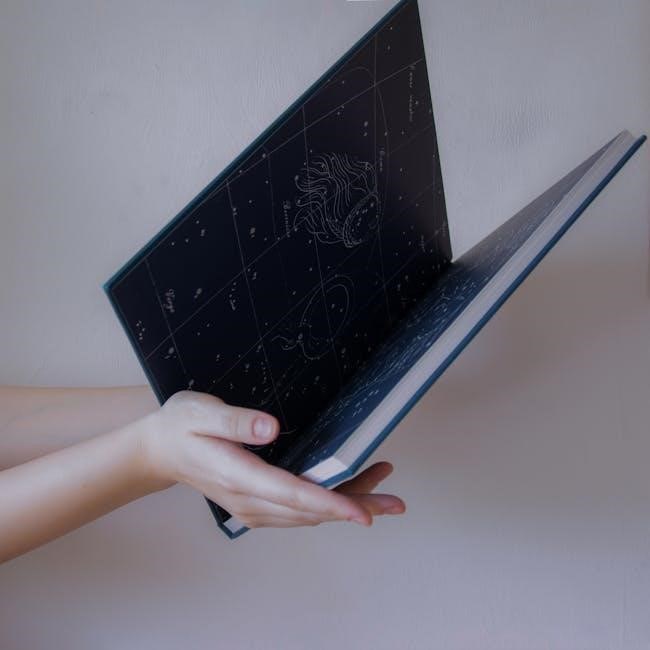Richard Tarnas’s Cosmos and Psyche explores the profound connection between celestial cycles and human experience, offering a groundbreaking integration of astrology and depth psychology.
Overview of the Book
Cosmos and Psyche: Intimations of a New World View is a groundbreaking work by philosopher Richard Tarnas, published in 2006. Spanning 592 pages, the book explores the intricate relationship between cosmic cycles and human experience, delving into archetypal patterns that shape history and consciousness. Tarnas examines how planetary transits correlate with significant historical events, blending astrology with depth psychology. The book challenges conventional views by proposing a unified vision of the cosmos and the human psyche, offering a new perspective on the interconnectedness of all things. It has become a seminal text in the field, inspiring both scholarly and popular discourse on the interplay of celestial and psychological forces.
Author Background: Richard Tarnas

Richard Tarnas is a philosopher and scholar known for his interdisciplinary work in the fields of cosmology, psychology, and culture. He holds a Ph.D. in Philosophy and Religion from the California Institute of Integral Studies. Tarnas is renowned for his book “The Passion of the Western Mind,” a comprehensive exploration of Western intellectual history. His work bridges traditional academic disciplines with deeper philosophical and spiritual inquiries. Tarnas’s teachings and writings have significantly influenced contemporary thought, particularly in the integration of astrology and depth psychology within a broader philosophical framework. He is also a notable public speaker, contributing to cultural and academic discussions and expanding his influence beyond academia.
Key Themes and Objectives
Cosmos and Psyche delves into the intricate relationship between cosmic cycles and human experience, aiming to uncover archetypal patterns that shape history and culture. Tarnas examines how planetary alignments correlate with significant historical events and cultural shifts. A central theme is the integration of astrology with depth psychology, particularly Jung’s concept of the collective unconscious. The book seeks to bridge the gap between the celestial and the psychological, proposing a new worldview that embeds human consciousness within a broader cosmic framework. By exploring myth, symbols, and the flow of images in consciousness, Tarnas offers a profound reinterpretation of the interplay between the universe and the human psyche.
Cosmic Cycles and Human Experience
Explores the connection between celestial movements and human affairs, revealing archetypal patterns that shape history and culture, challenging the modern worldview and inspiring a deeper understanding of cosmic influence on collective destiny.
The Connection Between Planetary Transits and Historical Events
Richard Tarnas examines how planetary alignments correlate with significant historical events, proposing that cosmic cycles influence collective human experiences. By analyzing planetary transits, he identifies recurring archetypal patterns that coincide with major historical shifts, such as revolutions, crises, and cultural transformations. Tarnas argues that these alignments are not mere coincidences but reflections of a deeper cosmic order. His research spans centuries, showcasing how planetary configurations, such as the opposition of Saturn and Pluto, have coincided with periods of societal upheaval. This correlation challenges the notion of history as a series of random events, instead revealing a harmonious interplay between the cosmos and human destiny.

Archetypal Patterns in Human History
Richard Tarnas identifies recurring archetypal patterns in human history that align with planetary cycles, reflecting a universal symbolic language embedded in the cosmos. These patterns, rooted in Jung’s collective unconscious, manifest across cultures and eras, revealing a deep order in historical events. Tarnas illustrates how archetypes like the hero, the trickster, and the great mother recur in collective experiences, shaped by the interplay of celestial movements. By examining these repetitions, he suggests that human history is not chaotic but follows a harmonious cosmic design. This perspective bridges astrology, psychology, and history, offering a new lens to understand humanity’s shared journey and destiny.
The Concept of the Collective Unconscious
The collective unconscious, as proposed by Carl Jung, refers to shared archetypes present in all humans. In Cosmos and Psyche, Richard Tarnas explores how these universal symbols are embedded within the cosmos, suggesting a profound interconnection between the human psyche and celestial patterns.
Jung’s Theory and Its Relation to the Cosmos
Carl Jung’s theory of the collective unconscious posits that universal archetypes are inherent in the human psyche. In Cosmos and Psyche, Richard Tarnas extends this concept by exploring its relationship with cosmic patterns. He suggests that these archetypes are not merely psychological constructs but are deeply embedded within the fabric of the universe. Tarnas argues that planetary transits and celestial alignments correlate with historical events and cultural shifts, reflecting a harmonious interplay between the macrocosm and the human psyche. This integration of Jungian psychology with astrology offers a novel perspective on the interconnectedness of all things.
The Role of Myth, Dreams, and Symbols
In Cosmos and Psyche, Richard Tarnas examines how myths, dreams, and symbols serve as bridges between the cosmic and psychological realms. Drawing on Jungian theory, he illustrates that these elements are not merely personal expressions but reflections of universal archetypes. Tarnas contends that myths, in particular, encode celestial patterns and historical events, while dreams reveal the inner workings of the collective unconscious. Symbols, as carriers of meaning, mediate between the external cosmos and the internal psyche, fostering a deeper understanding of human existence within a larger cosmic context. This interplay enriches our perception of reality and consciousness.

The Anima Mundi: The World Soul
The anima mundi, or world soul, represents the spiritual matrix connecting the cosmos and human consciousness, as explored in Cosmos and Psyche.
The Spiritual Matrix of the Cosmic Psyche
The spiritual matrix of the cosmic psyche, as detailed in Richard Tarnas’s Cosmos and Psyche, is an intricate web that intertwines celestial patterns with human consciousness. This matrix serves as the foundation for understanding how planetary archetypes influence historical events and cultural shifts. By examining the alignment of planetary transits and significant historical occurrences, Tarnas reveals a profound interconnectedness between the macrocosm and the human experience. This perspective suggests that the cosmos is not merely a backdrop but an active participant in shaping the collective unconscious, offering a new lens through which to view human history and psychology.
Flow of Images in Consciousness
The flow of images in consciousness, as explored in Cosmos and Psyche, reflects the dynamic interplay between the cosmic psyche and human perception. Richard Tarnas illustrates how planetary archetypes shape the symbolic imagery that emerges in myths, dreams, and cultural narratives. These images, deeply rooted in the collective unconscious, mirror the celestial patterns and their alignments. The book demonstrates how this flow of imagery is not random but aligned with cosmic cycles, revealing a hidden order that connects the universe to the human mind. This insight offers a profound understanding of how the cosmos influences the stream of consciousness, bridging the gap between the macrocosm and the inner world of the psyche.

Astrological Insights and Statistical Correlations
Cosmos and Psyche presents groundbreaking correlations between planetary archetypes and historical events, demonstrating how celestial patterns statistically align with human affairs, offering empirical validation of astrological principles.
Planetary Archetypes and Their Influence
In Cosmos and Psyche, Richard Tarnas examines how planetary archetypes—such as Jupiter, Saturn, and Uranus—shape human history and collective psychology. These archetypes, rooted in celestial patterns, symbolize universal themes like expansion, limitation, and revolution. Tarnas demonstrates how their alignments correlate with major historical events, cultural shifts, and the rise of influential ideas. By mapping these correlations, he reveals a profound interplay between the cosmos and human affairs, offering a new perspective on the nature of time and the unfolding of collective destiny. This approach bridges astrology and depth psychology, providing a holistic understanding of the forces that shape human experience.
Historical Events and Astrological Alignments
Richard Tarnas meticulously explores the correlation between significant historical events and specific astrological alignments, revealing a compelling interplay between celestial patterns and collective human experience. By analyzing planetary transits, such as the Jupiter-Uranus conjunction and Saturn-Pluto oppositions, Tarnas identifies recurring themes that align with major cultural, political, and philosophical shifts. For instance, the alignment of Uranus and Pluto during the 1960s coincided with a wave of social and intellectual revolutions. Tarnas’s research, spanning over 30 years, demonstrates how these alignments mirror the evolution of human consciousness, offering a deeper understanding of history as a reflection of cosmic order and archetypal unfolding.

Philosophical and Psychological Framework
Richard Tarnas integrates astrology with depth psychology, exploring the collective unconscious and the anima mundi, revealing a spiritual matrix that unites cosmic and human consciousness.
Integrating Astrology with Depth Psychology
In Cosmos and Psyche, Richard Tarnas bridges astrology and depth psychology, suggesting that planetary archetypes influence human consciousness. He draws on Jung’s collective unconscious, linking cosmic patterns to psychological themes. Tarnas argues that astrological cycles correlate with historical events and cultural movements, reflecting archetypal processes. By connecting celestial motions to human experience, he offers a holistic view of the cosmos and psyche, exploring how myth, dreams, and symbols are intertwined with astronomical phenomena. This integration challenges conventional boundaries, proposing a unified understanding of the universe and human psychology. Tarnas’s work invites a deeper exploration of the interplay between cosmic and psychological realms.
Cosmos and Psyche presents a transformative vision of human understanding, suggesting that the universe is inherently meaningful and interconnected. Richard Tarnas proposes that recognizing the alignment between cosmic cycles and human events fosters a deeper sense of participation in the universe. This perspective challenges materialistic worldviews, offering a holistic framework that integrates science, spirituality, and psychology. By exploring the symbolic language of the cosmos, Tarnas invites readers to embrace a new paradigm where human experience is deeply intertwined with celestial rhythms. This new world view encourages a shift from fragmentation to unity, inspiring a more harmonious relationship between individuals and the cosmos. Cosmos and Psyche has garnered critical acclaim for its innovative synthesis of astrology and psychology, inspiring both scholarly debates and popular interest in its paradigm-shifting ideas. Cosmos and Psyche has received widespread critical acclaim for its meticulous research and innovative integration of astrology and depth psychology. Scholars have praised Tarnas’s groundbreaking work for bridging the gap between celestial phenomena and human consciousness, offering fresh perspectives on historical events and archetypal patterns; While some critics have questioned the statistical correlations, the book is widely regarded as a seminal work in the field of archetypal astrology. Its interdisciplinary approach has sparked both admiration and debate, solidifying its place as a landmark text in modern philosophical and psychological discourse. Cosmos and Psyche has resonated deeply with both scholars and the general public, becoming a cultural touchstone in modern spiritual and philosophical discourse. Its accessible yet profound exploration of astrology and psychology has made it a bestseller, inspiring widespread discussion. The book has influenced various fields, from astrology to depth psychology, and even inspired a docuseries. Its ideas have sparked a renewed interest in the interconnectedness of the cosmos and human consciousness, making it a pivotal work in contemporary thought. Tarnas’s vision continues to shape cultural and intellectual landscapes, offering a transformative perspective on the human experience.A New World View: Implications for Human Understanding
Reception and Impact of the Book
Critical Acclaim and Scholarly Reviews

Popular Response and Cultural Influence





